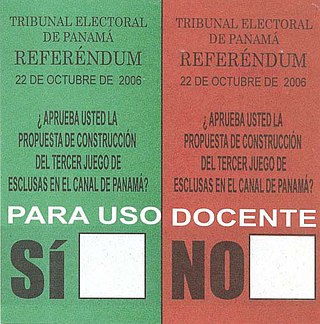The Political Compass is a website soliciting responses to a set of 62 propositions in order to rate political ideology in a spectrum with two axes: one about economic policy (left–right) and another about social policy (authoritarian–libertarian).

Voting is a method by which a group, such as a meeting or an electorate, convenes together for the purpose of making a collective decision or expressing an opinion usually following discussions, debates or election campaigns. Democracies elect holders of high office by voting. Residents of a jurisdiction represented by an elected official are called "constituents", and the constituents who choose to cast a ballot for their chosen candidate are called "voters." There are different systems for collecting votes, but while many of the systems used in decision-making can also be used as electoral systems, any which cater to proportional representation can only be used in elections.
An opinion poll, often simply referred to as a survey or a poll, is a human research survey of public opinion from a particular sample. Opinion polls are usually designed to represent the opinions of a population by conducting a series of questions and then extrapolating generalities in ratio or within confidence intervals. A person who conducts polls is referred to as a pollster.
An electoral swing analysis shows the extent of change in voter support, typically from one election to another, expressed as a positive or negative percentage. A multi-party swing is an indicator of a change in the electorate's preference between candidates or parties, often between major parties in a two-party system. A swing can be calculated for the electorate as a whole, for a given electoral district or for a particular demographic.

Alexander "Sascha" Van der Bellen, also referred to by the abbreviation VDB, is the current president of Austria. He previously served as a professor of economics at the University of Vienna, and after joining politics, as the spokesman of the Austrian Green Party.
Open-source governance is a political philosophy which advocates the application of the philosophies of the open-source and open-content movements to democratic principles to enable any interested citizen to add to the creation of policy, as with a wiki document. Legislation is democratically opened to the general citizenry, employing their collective wisdom to benefit the decision-making process and improve democracy.

Kieskompas is a Dutch voting advice website. Visitors can use the application to discover their position in the political landscape for upcoming elections. Electoral Compass was officially established at the VU Amsterdam on October 23, 2007.
smartvote is a Swiss voting advice application (VAA) similar to Stemwijzer in the Netherlands or Wahl-o-Mat in Germany. In Switzerland, smartvote has been offering its services since 2003, and since 2005 it has been operated in collaboration with local partners in other countries.

The June 2010 San Francisco general elections were held on June 8, 2010 in San Francisco, California. The elections included seats to various political parties' county central committees, two seats to the San Francisco County Superior Court, and seven ballot measures.
A voting advice application or voting aid application (VAA) or vote matcher or vote compass or election compass is an application that helps voters find a political candidate or political party that stands closest to their preferences. VAAs are a recent phenomenon in modern election campaigning.

NEOS – The New Austria and Liberal Forum is a liberal political party in Austria. It was founded as NEOS – The New Austria in 2012. In 2014, NEOS merged with Liberal Forum and adopted its current name.
Civic technology, or civic tech, enhances the relationship between the people and government with software for communications, decision-making, service delivery, and political process. It includes information and communications technology supporting government with software built by community-led teams of volunteers, nonprofits, consultants, and private companies as well as embedded tech teams working within government.

The Colorado Caucus is the electoral process used in Colorado to appoint candidates for certain political offices and start the process of electing new leaders for political party leadership. It takes the form of a series of precinct caucuses, meetings of registered electors within a precinct who are members of a particular major political party. The purpose of precinct caucuses is to elect precinct committee persons and delegates to county assemblies, including those that elect delegates to the presidential nominating conventions.
Mydemocracy.ca is a public consultation commissioned by the Canadian federal government. It is intended to inform electoral reform. Replacing the existing first-past-the-post system with another voting system, before the next election, was a 2015 election promise.
Social media was used extensively in the 2020 United States presidential election. Both incumbent president Donald Trump and Democratic Party nominee Joe Biden's campaigns employed digital-first advertising strategies, prioritizing digital advertising over print advertising in the wake of the pandemic. Trump had previously utilized his Twitter account to reach his voters and make announcements, both during and after the 2016 election. The Democratic Party nominee Joe Biden also made use of social media networks to express his views and opinions on important events such as the Trump administration's response to the COVID-19 pandemic, the protests following the murder of George Floyd, and the controversial appointment of Amy Coney Barrett to the Supreme Court.

The 2024 European Parliament election was held in the European Union (EU) between 6 and 9 June 2024. It was the tenth parliamentary election since the first direct elections in 1979, and the first European Parliament election after Brexit. A total of 720 Members of the European Parliament (MEPs) were elected to represent more than 450 million people from 27 member states. This election also coincided with a number of other elections in some European Union member states.

Political polarization is a prominent component of politics in the United States. Scholars distinguish between ideological polarization and affective polarization, both of which are apparent in the United States. In the last few decades, the U.S. has experienced a greater surge in ideological polarization and affective polarization than comparable democracies.

A virtual politician, or an AI politician refers to a non-human entity seeking or in government office. A virtual politician would have similar power to a human serving in the same position, but would be programmed to make choices based on an artificially intelligent algorithm.

Presidential elections were held in Austria on 9 October 2022. Incumbent Alexander Van der Bellen from the Greens was eligible for one more term and ran for re-election. About 6.36 million voting-age citizens were eligible to vote.
Policy.nz is an interactive, online voting advice application run during election campaigns. It simplifies and categorises the election policies of political parties and candidates and allows users to compare policies within topics. Using interactive features, users can save policies or view policies with party or candidate names hidden.










